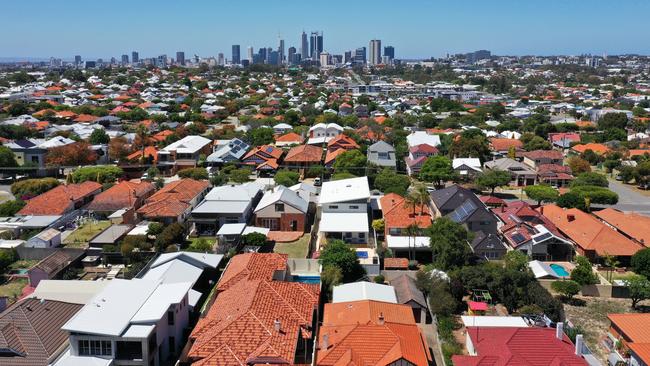Landlord ‘remote investing’ trend creates new danger for tenants
Recent landlord controls have spurred a change in the markets attracting new investors, creating big problems for tenants, new research shows.

Australia’s biggest capitals are in dire need of more rental properties, but the investors who could supply this accommodation are turning elsewhere, new research shows.
Figures released exclusively this week showed “remote investing”, where property investors purchase far from where they live, has accelerated for the third year running.
The average distance between where landlords live and where they are investing has reached 857km, the data from MCG Quantity Surveyors revealed.
MORE: King Kyle’s wedding mansion once had opium den
This is up from 559km in the year to November 2021, and 294km in the pre-pandemic period to January 2020.
And it’s a bad sign for cities like Sydney, Brisbane and Melbourne, where becoming a landlord is not just expensive, it’s becoming more legislated.

MCG director Mike Mortlock said the danger for cities where local governments were proposing new landlord controls was the policies may discourage investors from participating in those markets.
MORE: Houso with 3 homes reveals big mistake regular buyers make
And it would be doing so at just the time when investors were already more comfortable with the idea of buying properties much further from their local markets.
The end result is that the efforts to “clamp down” on landlords in the hopes of helping tenants may actually backfire by reducing the supply of available rentals, Mr Mortlock said.
“Our tightest rental markets are suffering from a severe shortage of rental property supply, but much of that is due to politics rather than market forces,” he said.

“Remote buying lets investors vote with their dollars when it comes to legislative changes in the tenancy space. Expect those jurisdictions which introduce anti-landlord/pro-tenant/high-tax legislation to feel the sting of even further reduced investor participation.”
MORE: Hemsworth hide-out sells for record $37m
“Remote investing” had been a strong trend during the early pandemic, but rather than subsiding when lockdowns ended, it’s picked up, Mr Mortlock said.
“There was a possibility once lockdowns restrictions eased, the re-introduction of in-person inspections could have seen investors choosing assets closer to home,” Mr Mortlock said.
“Instead, the opposite has happened. Investors have embraced remote investing and are now entirely comfortable with securing property assets in the best possible markets regardless of location.”

Mr Mortlock said cities with tight rental markets should be encouraging investor purchasing to boost the supply of rental housing, rather than trying to curtail investment.
“Our data indicates these regions should be looking to entice more investment from right across the nation, not discourage it through anti-investor rhetoric and ongoing restrictions that favour tenants over landlords.”
Ray White chief economist Nerida Conisbee said anti-investor rhetoric from governments and regulators over the last eight years has helped drive much of the current rental crisis.
She added that much of the government stimulus injected into the real estate market during the early pandemic was aimed at first home buyers but similar investor incentives may help tenants. “The country needs more rental housing,” she said.

Michelle McLean, senior property manager at Leah Jay, said landlord reforms introduced in NSW this year, such as a ban on “rental bidding”, were counterproductive.
Rent bidding is typically when a tenant or an agent negotiates the price of a rental property upwards, rather than renting at a fixed price.
Ms McLean said the most significant increase in rent bidding since the government’s announcement is occurring at the lower end of the market.
“We are seeing tenants competing for properties at the cheaper end of the rental market becoming increasingly desperate in their attempts to secure a home in an environment of such tight vacancy. They are pulling out all the stops,” Ms McLean said.

Real Estate Institute of NSW CEO Tim McKibbin said political decisions were making the current rental crisis worse.
“When politics is prioritised over policies, ceremonial moves like banning rent bidding for agents too often end up backfiring on consumers,” Mr McKibbin said.
“Banning agents from asking above the advertised rent has had no impact, as rent bidding was always driven by desperate tenants.
“But with increased awareness of the practice, more tenants have become switched on to the idea of offering over and above the asking rent.”
Originally published as Landlord ‘remote investing’ trend creates new danger for tenants

